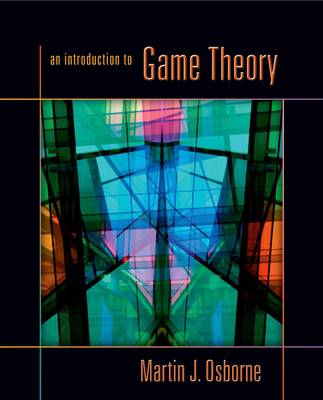
- Retrait gratuit dans votre magasin Club
- 7.000.000 titres dans notre catalogue
- Payer en toute sécurité
- Toujours un magasin près de chez vous
- Retrait gratuit dans votre magasin Club
- 7.000.0000 titres dans notre catalogue
- Payer en toute sécurité
- Toujours un magasin près de chez vous
Description
Game-theoretic reasoning pervades economic theory and is used widely in other social and behavioral sciences. An Introduction to Game Theory, by Martin J. Osborne, presents the main principles of game theory and shows how they can be used to understand economic, social, political, and biological phenomena. The book introduces in an accessible manner the main ideas behind the theory rather than their mathematical expression. All concepts are defined precisely, and logical reasoning is used throughout. The book requires an understanding of basic mathematics but assumes no specific knowledge of economics, political science, or other social or behavioral sciences.
Coverage includes the fundamental concepts of strategic games, extensive games with perfect information, and coalitional games; the more advanced subjects of Bayesian games and extensive games with imperfect information; and the topics of repeated games, bargaining theory, evolutionary equilibrium, rationalizability, and maxminimization. The book offers a wide variety of illustrations from the social and behavioral sciences and more than 280 exercises. Each topic features examples that highlight theoretical points and illustrations that demonstrate how the theory may be used. Explaining the key concepts of game theory as simply as possible while maintaining complete precision, An Introduction to Game Theory is ideal for undergraduate and introductory graduate courses in game theory.
Coverage includes the fundamental concepts of strategic games, extensive games with perfect information, and coalitional games; the more advanced subjects of Bayesian games and extensive games with imperfect information; and the topics of repeated games, bargaining theory, evolutionary equilibrium, rationalizability, and maxminimization. The book offers a wide variety of illustrations from the social and behavioral sciences and more than 280 exercises. Each topic features examples that highlight theoretical points and illustrations that demonstrate how the theory may be used. Explaining the key concepts of game theory as simply as possible while maintaining complete precision, An Introduction to Game Theory is ideal for undergraduate and introductory graduate courses in game theory.
Spécifications
Parties prenantes
- Auteur(s) :
- Editeur:
Contenu
- Nombre de pages :
- 560
- Langue:
- Anglais
Caractéristiques
- EAN:
- 9780195128956
- Date de parution :
- 07-08-03
- Format:
- Livre relié
- Format numérique:
- Genaaid
- Dimensions :
- 198 mm x 242 mm
- Poids :
- 1120 g

Les avis
Nous publions uniquement les avis qui respectent les conditions requises. Consultez nos conditions pour les avis.






